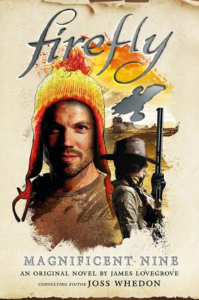James Lovegrove’s first “Firefly” novel – 2018’s “Big Damn Hero,” co-plotted with Nancy Holder – spans several genres. But his second is a straight-up Western, all set on one dusty planet. “The Magnificent Nine” (March 2019), as the title suggests, has the same plot as the 1960 Western film classic “The Magnificent Seven.”
But we get to see how our big gorramn heroes deal with the situation: The already bedraggled townsfolk of Coogan’s Bluff on Thetis are being harassed by murderous, rapist bandits who aim to control the water supply.
Old West flavor
Despite a writing background that leans toward science fiction and mysteries, Lovegrove delivers a good Western here. Characters talk – and even think — in the Old West style, especially those who particularly fit the genre bill — Mal, Jayne, Zoe and Kaylee. “The Magnificent Nine” is foremost a Jayne tale, and we get a pretty big revelation: He used to have a woman he loved, Temperance McCloud.

“The Magnificent Nine” (2019)
Author: James Lovegrove
Series: “Firefly” No. 2
Genre: Science fiction
Setting: Thetis, between TV series and movie
Lovegrove balances Jayne’s two sides fairly well, although he leans more toward the reformed, nicer version of Jayne found in the “Serenity” movie. This book takes place after the TV series’ run of episodes; Inara and Book are still around, although both are thinking about leaving.
My favorite point on Jayne’s character arc is “Jaynestown” (1.7), a story of him accidentally doing some good and being genuinely uncomfortable about the townsfolk worshiping him. As he gradually becomes more comfortable with the idea, humming “Hero of Canton” (as he does again in this book), it parallels how his brain is turning over the idea of doing things for people other than himself.
“The Magnificent Nine” is a big step on his journey toward decency, as he takes up a mission (and talks the whole crew into it) of helping his former flame, Temperance, even though there’s no profit in it. Then he bonds with 13-year-old Jane, who might be his daughter.
I would’ve liked slightly more inner conflict. There’s never much doubt that Jayne will always do the right thing in this book. His outer veneer of selfishness is becoming nothing more than a veneer.
(Extremely) unreliable narrators
Although I liked reading about many of the guest stars here – including bandit leader Elias Vandal, his second-in-command Shem and Coogan’s Bluff Mayor Huck Gillis – the author is dishonest in his presentation of two of them. They turn out to be unreliable narrators (one via a minor fib, another via a major one), but the unreliable narration is presented in a way I’ve never encountered before.
Lovegrove presents their unreliable accounts of events within a normal third-person omniscient narrator style, rather than the first-person style (a tall verbal tale, for instance). Put bluntly, the author cheats, because the reader is given no chance to realize that what we read is inaccurate.

He also bails on POV chapters for some key characters at the time it’d be most interesting to know their thoughts. Vandal is sort of like Negan from “The Walking Dead,” and while he gets a satisfying comeuppance at the end, I would’ve liked to have gotten into his mind, to find out what it’s like for a bully when the tables turn. Where do the thoughts of this smart but evil man go? Is he shocked, or did he know it was just a matter of time?
Hewing tightly to the “Magnificent Seven” structure, the plot is straightforward, and Lovegrove flirts with commenting on “Firefly’s” specific tropes. One chapter is called “The Inevitable Bar Brawl.” Most of the chapter titles tell you what’s going to happen in that chapter, so this book is about the experience of the journey, not about surprising the reader.
He delivers one plot fake-out, though, that reminds me of “Buffy’s” “Gingerbread” (3.11). In the B-plot of that episode, we follow Xander’s and Oz’s attempts to help their friends, but they arrive on the scene after the day has been saved. The same thing happens in “The Magnificent Nine” with the private security firm Inara calls on.
A fascinating dilemma
However, the cavalry’s late arrival does serve to tidily resolve the conflict, it leads to a great moment of humor (Mal being mistaken for Vandal), and it raises a fascinating dilemma – one I would’ve liked to know more about.
The security firm can of course protect the citizens from the bandits, but they have no legal authority to arrest the bandits. But they can’t easily turn them over to the government, either. The Alliance – although having official jurisdiction — ignores Thetis because it’s so poor that there are no taxes to be gleaned.
Lovegrove leaves this situation unresolved, and I suppose that’s OK. Dealing with oppressive governments isn’t easy (as we know from many “Firefly” stories), and dealing with criminals when the government doesn’t care isn’t easy either.
“The Magnificent Nine” leans far more toward the Western side of space-Western, which wouldn’t be my preference, but it’s fine when the genre is captured with such love and accuracy. Lovegrove might not deliver top-shelf, sweeping “Firefly,” but he does deliver genuine, down-and-dirty “Firefly.”
Our nine favorite heroes are on point, and the book captures the flavor of a backwater planet that ironically is short on water.

